Essays
Essays
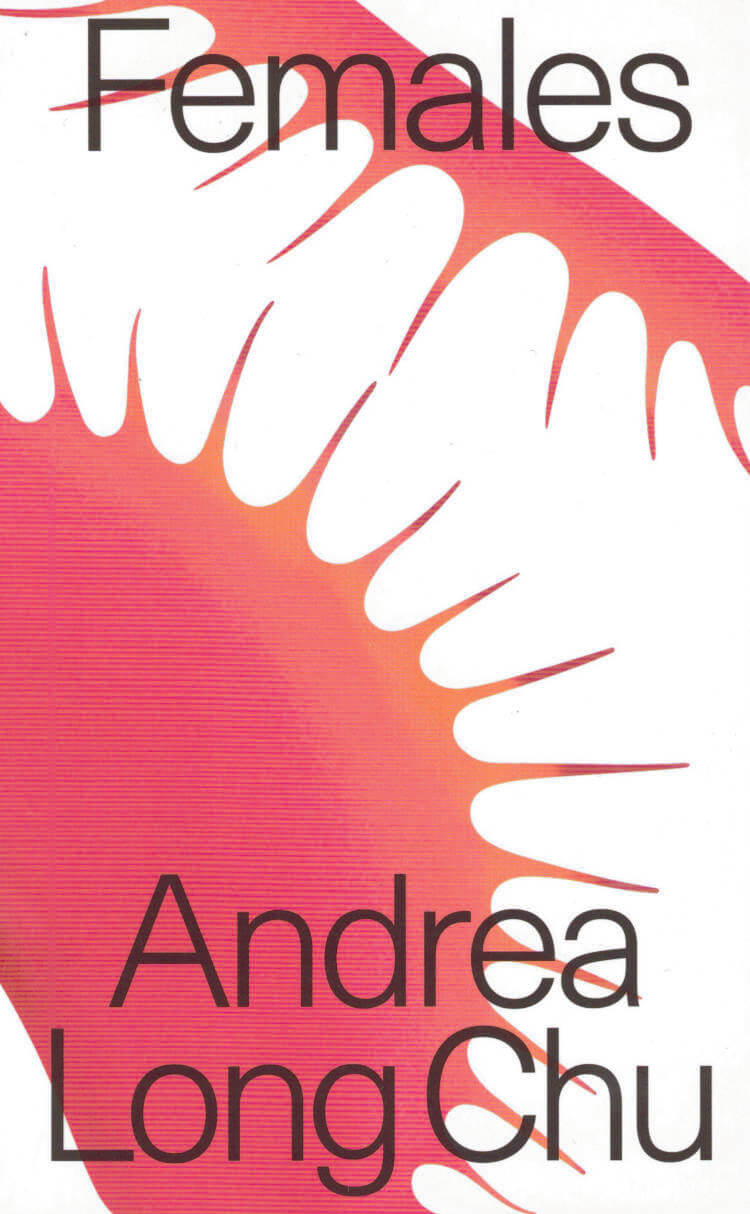
Females
Females is Andrea Long Chu's genre-defying investigation into sex and lies, desperate artists and reckless politics, the smothering embrace of gender and the punishing force of desire.
Drawing inspiration from a forgotten play by Valerie Solanas—the woman who wrote the SCUM Manifesto and shot Andy Warhol—Chu aims her searing wit and surgical intuition at targets ranging from performance art to psychoanalysis, incels to porn. She even has a few barbs reserved for feminists like herself. Each step of the way, she defends the indefensible claim that femaleness is less a biological state and more a fatal existential condition that afflicts the entire human race— men, women, and everyone else. Or maybe she's just projecting.
A thrilling new voice who has been credited with launching the "second wave" of trans studies, Chu shows readers how to write for your life, baring her innermost self with a morbid sense of humor and a mordant kind of hope.

The Politics of Poetic Form
The Politics of Poetic Form: Poetry And Public Policy is a series of essays from a discussion that occurred at the New School for Social Research in New York. The discussion mines the relationship between poetic composition and political expression. Poetry's relationship to public policy typically has a questionable margin of relation. Not only does this volume posit that poetry is a dynamic medium for the consideration of political ideas, it focuses on the ideological weight specific formal innovations bring to poetry. Some of the writers include Jerome Rothenberg, Ron Silliman, Susan Howe, Nathaniel Mackey and Charles Bernstein.
Charles Bernstein (born April 4, 1950) is an American poet, theorist, editor, and literary scholar. Bernstein holds the Donald T. Regan Chair in the Department of English at the University of Pennsylvania. He is one of the most prominent members of the Language (or L=A=N=G=U=A=G=E) poets. In 2006 he was elected a Fellow of the American Academy of Arts and Sciences. In 2005, Bernstein was awarded the Dean's Award for Innovation in Teaching at the University of Pennsylvania. He has also been a visiting professor at Columbia University, Brown University, and Princeton University.

Why Call it Labor? On Motherhood and Art Work
This publication comprises four essays and one conversation with contemporary artists and curators discussing their experience of becoming mothers as professionals in the arts, its reality and effects. While their reflections represent a similar strata of art worker in terms of background, class, and career trajectory, the impact of instruments of patriarchy on rendering maternity invisible that they describe is recognizable and insidious.
Contributions by Mai Abu ElDahab, Basma Alsharif, Lara Khaldi, Mary Jirmanus Saba, and Mirene Arsanios with Nikki Columbus.
Edited by Mai Abu ElDahab
Published by Mophradat and Archive Books
Text design layout by Valerie Arif
Arabic and English
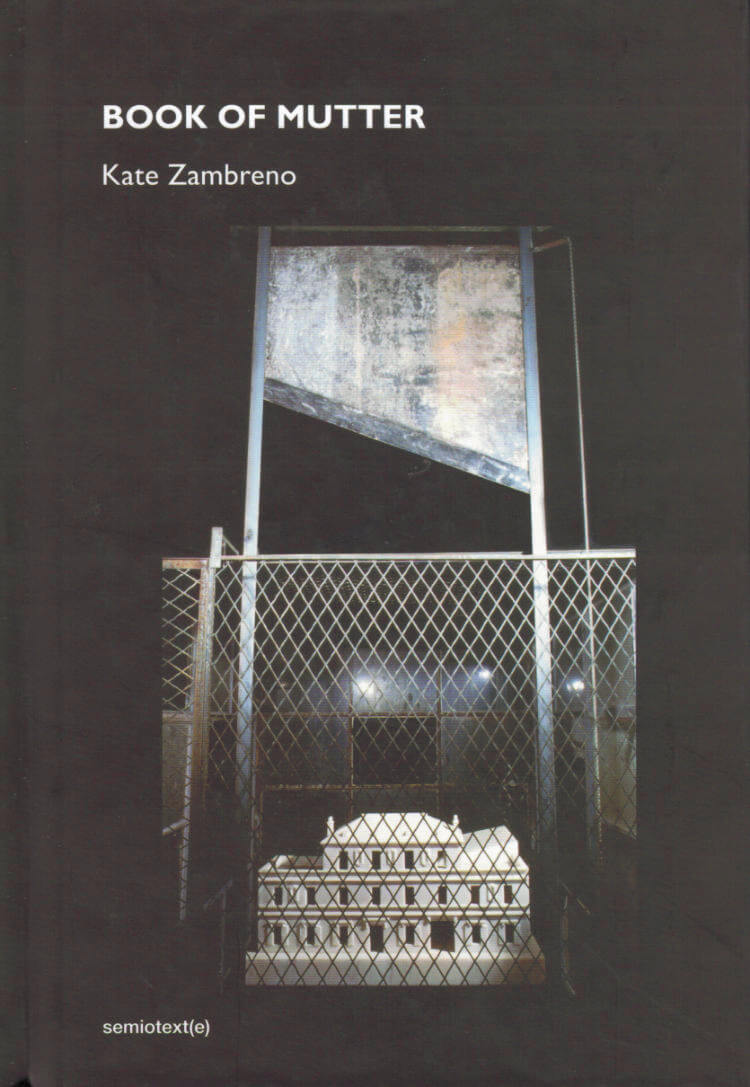
Book of Mutter
A fragmented, lyrical essay on memory, identity, mourning, and the mother.
"Writing is how I attempt to repair myself, stitching back former selves, sentences. When I am brave enough I am never brave enough I unravel the tapestry of my life, my childhood." - from Book of Mutter
Composed over thirteen years, Kate Zambreno's Book of Mutter is a tender and disquieting meditation on the ability of writing, photography, and memory to embrace shadows while in the throes, and dead calm, of grief. Book of Mutter is both primal and sculpted, shaped by the author's searching, indexical impulse to inventory family apocrypha in the wake of her mother's death. The text spirals out into a fractured anatomy of melancholy that includes critical reflections on the likes of Roland Barthes, Louise Bourgeois, Henry Darger, Theresa Hak Kyung Cha, Peter Handke, and others. Zambreno has modeled the book's formless form on Bourgeois's Cells sculptures—at once channeling the volatility of autobiography, pain, and childhood, yet hemmed by a solemn sense of entering ritualistic or sacred space.
Neither memoir, essay, nor poetry, Book of Mutter is an uncategorizable text that draws upon a repertoire of genres to write into and against silence. It is a haunted text, an accumulative archive of myth and memory that seeks its own undoing, driven by crossed desires to resurrect and exorcise the past. Zambreno weaves a complex web of associations, relics, and references, elevating the prosaic scrapbook into a strange and intimate postmortem/postmodern theater.
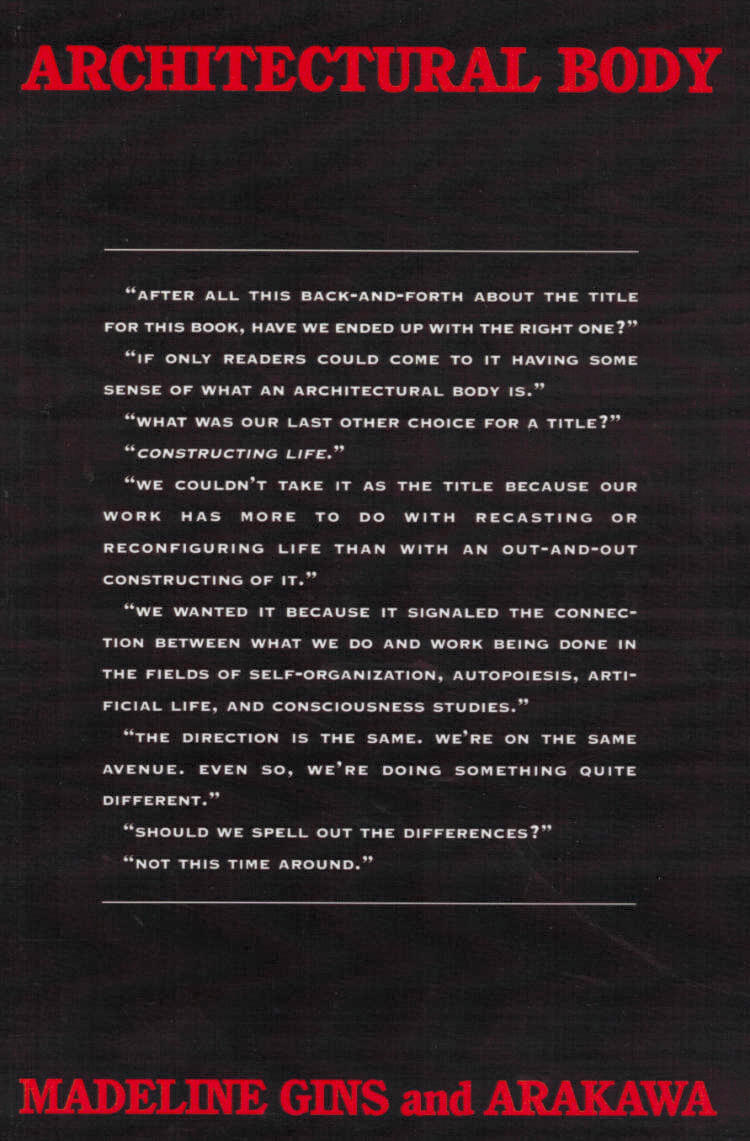
Architectural Body
A verbal articulation of the authors' visionary theory of how the human body, architecture, and creativity define and sustain one another
This revolutionary work by artist-architects Arakawa and Madeline Gins demonstrates the inter-connectedness of innovative architectural design, the poetic process, and philosophical inquiry. Together, they have created an experimental and widely admired body of work, museum installations, landscape and park commissions, home and office designs, avant-garde films, poetry collections, that challenges traditional notions about the built environment. This book promotes a deliberate use of architecture and design in dealing with the blight of the human condition; it recommends that people seek architectural and aesthetic solutions to the dilemma of mortality.
In 1997 the Guggenheim Museum presented an Arakawa/Gins retrospective and published a comprehensive volume of their work titled Reversible Destiny: We Have Decided Not to Die. Architectural Body continues the philosophical definition of that project and demands a fundamental rethinking of the terms "human" and "being." When organisms assume full responsibility for inventing themselves, where they live and how they live will merge. The artists believe that a thorough re-visioning of architecture will redefine life and its limitations and render death passe. The authors explain that "Another way to read reversible destiny... Is as an open challenge to our species to reinvent itself and to desist from foreclosing on any possibility."
Audacious and liberating, this volume will be of interest to students and scholars of 20th-century poetry, postmodern critical theory, conceptual art and architecture, contemporary avant-garde poetics, and to serious readers interested in architecture's influence on imaginative expression.
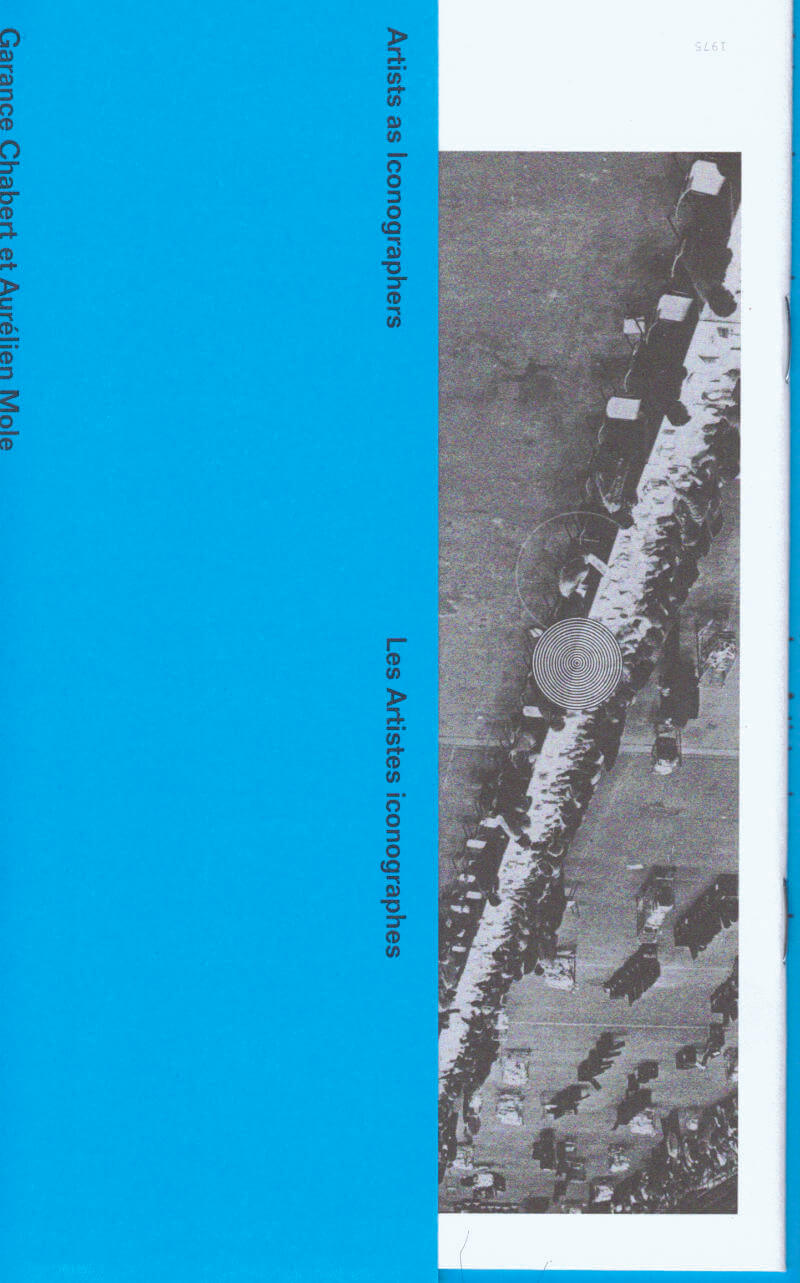
Artists as Iconographers
Aurélien Mole, Garance Chabert
For over a century now, iconographer artists have fuelled their approach by tapping into the diversity of images produced by othersand spread through society by industrial means. From collage to the post-internet school, from archival installations to Appropriationist quotation and image constellations, the present book puts these art practices into perspective, focusing on the last forty years, an extraordinarily dynamic period that recently witnessed the invention and development of a new way of disseminating information and images, the internet. Through theoretical texts, artists’ interviews, and exhibition practices, the book maps the connections artists maintain with images and examines emotion as the driving force in our interactions with them.
Editors: Garance Chabert & Aurélien Mole
Texts: François Aubart, Garance Chabert & Aurélien Mole, Ingrid Luquet-Gad, Jan Verwoert.
Interviews: Pierre-Olivier Arnaud, Barbara Breitenfellner, Céline Duval, Haris Epaminonda, Aurélien Froment, Wade Guyton, Camille Henrot, Thomas Hirschhorn, Pierre Leguillon, Jonathan Monk, Clément Rodzielski, Linder Sterling, John Stezaker, Oriol Vilanova, by Timothée Chaillou.
32 pages leaflet, Turmoil, Batia Suter, 2020, layered reproductions excerpt from a series in progress, various size. Courtesy of Batia Suter.
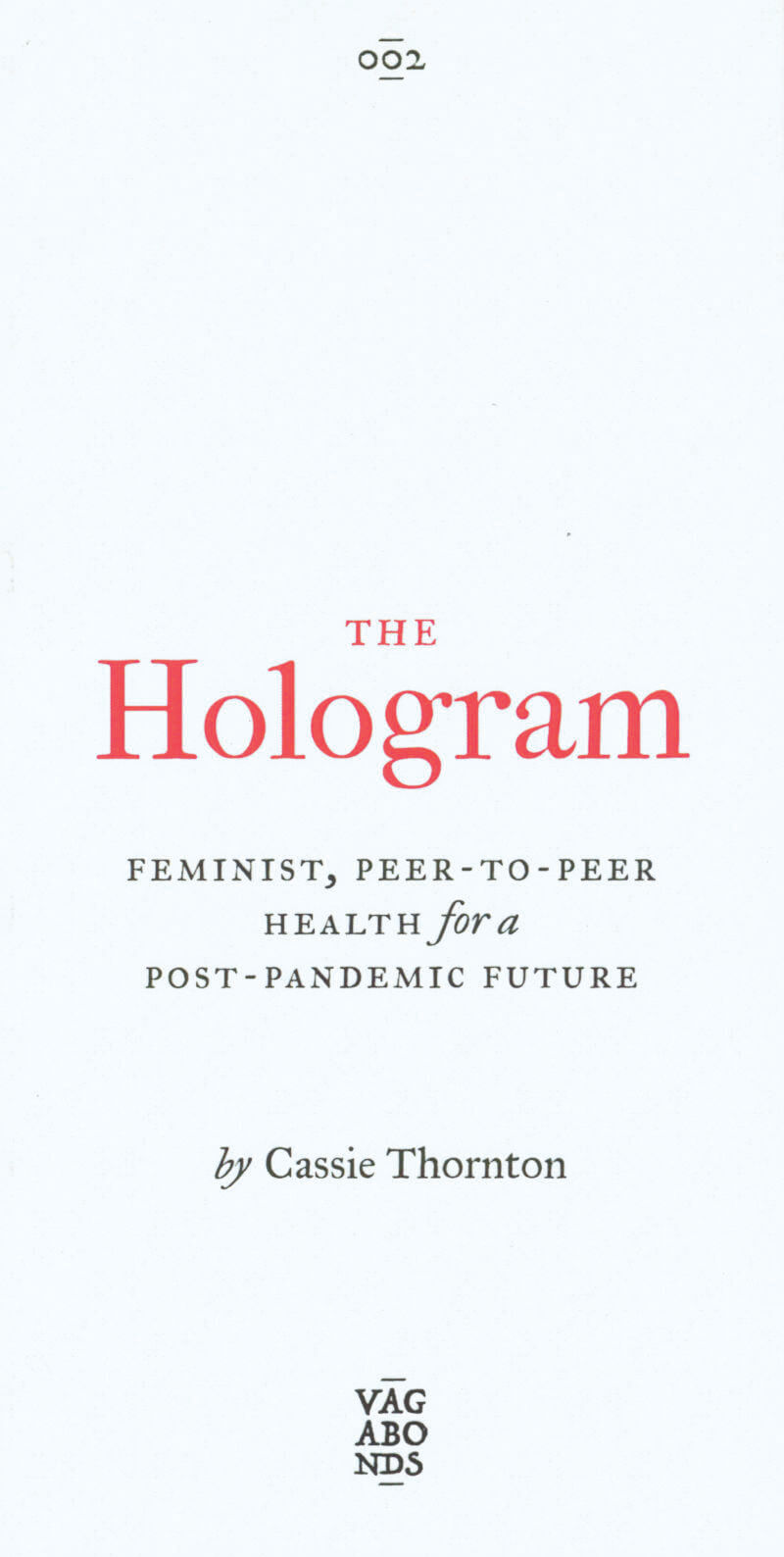
The Hologram: Feminist, Peer-To-Peer Health for a Post-Pandemic Future
In an era when capitalism leaves so many to suffer and to die, with neoliberal 'self-care' offering little more than a bandaid, how can we take health and care back into our hands? In The Hologram, Cassie Thornton puts forward a bold vision for revolutionary care: a viral, peer-to-peer feminist health network. The premise is simple: three people - a 'triangle' - meet on a regular basis, digitally or in person, to focus on the physical, mental and social health of a fourth - the 'hologram'. The hologram, in turn, teaches their caregivers how to give and also receive care; each member of their triangle becomes a hologram for another, different triangle, and so the system expands. Drawing on radical models developed in the Greek solidarity clinics during a decade of crisis, and directly engaging with discussions around mutual aid and the coronavirus pandemic, The Hologram develops the skills and relationships we desperately need for the anti-capitalist struggles of the present, and the post-capitalist society of the future. One part art, one part activism, one part science fiction, this book offers the reader a guide to establishing a Hologram network as well as reflections on this cooperative work in progress.
Cassie Thornton is an artist and activist from the US, currently living in Canada. She refers to herself as a feminist economist, a title that frames her work as that of a social scientist actively preparing for the economics of a future society that produces health and life without the tools that reproduce oppression, like money, police or prisons.

Slow Down and Walk: A Conversation
Nadina George-Graves, Okwui Okpokwasili
In a conversation that took place in August 2020, during a global pandemic and in the wake of mass uprisings across the US against systemic racism and police brutality, scholar and choreographer Nadine George-Graves and performance-maker and dancer Okwui Okpokwasili discuss ideas of collaborative practice, radical forgiveness, virtuosity, and community. Reflecting on Okpokwasili's and Peter Born's practice and installation from March 2020, Sitting on a Man's Head, the two women consider how art making reflects the kind of imagination of how one might live in the world, proposing modes of relation that are neither predatory nor transactional, but grounded in care.
This conversation originally took part as an event for 50WomenAtYale150, and was co-sponsored by Yale Women, the Yale Alumni Association, and the Yale Black Alumni Association.
This pamphlet is part of UDP's 2020 Pamphlet Series: twenty commissioned essays on collective work, translation, performance, pedagogy, poetics, and small press publishing. The pamphlets are available for individual purchase and as a subscription. Each offers a different approach to the pamphlet as a form of working in the present, an engagement at once sustained and ephemeral.
Okwui Okpokwasili is a performer, choreographer, and writer creating multidisciplinary performance pieces that draw viewers into the interior lives of women of color, particularly those of African and African American women, whose stories have long been overlooked and rendered invisible. Her formally experimental productions include Bronx Gothic, Adaku's Revolt, Poor People's TV Room, and Sitting on a Man's Head, and bring together elements of dance, theater, and the visual arts (with spare and distinctive sets designed by her husband and collaborator, Peter Born).

Design Struggles - Intersecting Histories, Pedagogies, And Perspectives
This publication offers a critical assessment of the complicity of design in creating, perpetuating, and reinforcing social, political, and environmental problems, both today and in the past. It proposes going against the grain by problematising Western notions of design to foster situated, decolonial, and queer-feminist modes of disciplinary self-critique, and looks at design through the intersections of gender, culture, ethnicity, and class. Applying robust scholarly insight with engaging and accessible modes of conveyance and storytelling, an urgent and expansive array of voices and views emerge from those engaged in struggles with, against, or around the field of design.

Public Health in Crisis
David Bergé, Hulya Ertas and 2 more
Epidemics and pandemics undermine societies and highlight the vulnerability of relations people have created to the land, other species, and each other. This book presents fragments of disease management in the Mediterranean from the 15th-century onwards and in the Aegean Archipelago in the last two centuries. From religious to medical approaches to the Bubonic Plague, through the creation of lazarettos, to the famine in occupied Syros, to ghost ships drifting on the Mediterranean: citizens are forced to avoid citizens. Public health in crisis: confinement versus mobility, awakening memories of totalitarian regimes.
CONTENTS
Impending Arrivals by Dimitra Kondylatou
Cruises to Nowhere
Covid-19 stricken Ships
Ghost Ships drifting on the Mediterranean
Suspended Arrivals by Dimitra Kondylatou
Le Corbusier Confined
Venice, Lazaretto and Black Death
Confined Spaces by Dimitra Kondylatou
Religious versus Medical Approaches to the Plague
Public Health and Public Order
Architectures of Control
The Lazaretto at Syros
Confinement and Totalitarianism, Famine in Occupied Syros
by Nicolas Lakiotakis
Panic Room. Waiting Room. Island.
by Hulya Ertas

Free Love Paid Love
Juan Duque, Nicolas Lakiotakis and 2 more
Nowhere in Cycladic culture has love been defined in a singular all-encompassing manner. Forces of attraction, affection, connection, and relation were ascribed in a plurality of ways. Through symposia in Delos, the tax haven of antiquity, 17th-century transactions of love involving pirates, slaves, and Mykonians; naturist communities reliving sexual freedom in the 1960-70s and 21st-century tourists quest in search of love, free or paid; this book gathers fragments of expressions of affection across Mykonos island. Mykonos has long defined itself as a self-ruling place far away from realities lived elsewhere.
CONTENTS
Transactions of Love
by Nicolas Lakiotakis
To Watch every Sunset as if it was the Last One
by Juan Duque
Faces of Love
by Denis Maksimov
Professional Hugs
by Dimitra Kondylatou

The Architect is Absent
Dimitra Kondylatou, Nicolas Lakiotakis and 2 more
The white cubical house, the vernacular architecture in the Aegean Archipelago, knows no author. Its capacity to resist harsh climatic and topographic circumstances has been improved and adjusted through time and seems today close to perfection. The white-washed Cycladic House has become iconic to the image of Greece through the construction of national and tourism narratives. What happens when an architect steps into this process of anonymous transmission of skills? In 1966 music composer, architect, and engineer Iannis Xenakis articulated a response to this tradition and designed, from his base in Paris, a holiday house on the island of Amorgos while choosing to remain absent throughout the construction process.
CONTENTS
Constructing through Absence
by Hulya Ertas
Meteorites
by Mâkhi Xenakis
Summer Home for François-Bernard Mâche by Iannis Xenakis, 1966–74
by Sharon Kanach
Villa Mâche: a harsh hijack against the space of the sun
by David Bergé
Traveling to the Cyclades: Modernist Projections
by Dimitra Kondylatou
Iannis Xenakis, Selected Projects from Critical Index
by Sven Sterken

Another Gaze Journal 04
Including essays about Madeline Anderson, Lorenza Mazzetti, Laure Prouvost, Ben Rivers & Anocha Suwichakornpong, Agnieszka Holland’s Spoor, Susan Sontag’s filmmaking career, Storm De Hirsch, Zia Anger, Ashley Connor, Bruce LaBruce, Pina Bausch/Chantal Akerman, Magdalena Montezuma, Rebecca Horn, Anne Charlotte Robertson, Zhu Shengze, Beatriz Santiago Muñoz, Maya Da-Rin, Camila Freitas, Gong Li
An in-depth Afro-Brazilian roundtable with Tatiana Carvalho Costa, Janaina Oliveira, Everlane Moraes and Kênia Freitas; sections on Kira Muratova and Anne Charlotte Robertson; essays on subtitles, diffractive cinemas, ecocriticism/the anthropocene, literary adaptations, intimacy coordinators, strike on film, representing the internet,
Interviews with Betzy Bromberg, Zia Anger & Ashley Connor, Brett Story, Amandine Gay, Andrea Luka Zimmerman & Therese Henningsen
Experimental criticism from Kathryn Scanlan, Jen Calleja and Elissa Suh.

Dissent Without Modification
Dissent Without Modification is a research book composed of interviews with radical and progressive artists and thinkers, who started their education and careers in the 1990s. Some are well-known, some are not. They are African, European, and American women working as painters, photographers, performers, hackers, activists and educators, among other roles such as Lisha Sterling, Monster Chetwynd and Kathrin Böhm.
What connects these brilliant women together, now in their late thirties, mid forties, early fifties and sixties; is that the decade of the 1990s had a culturally significant impact on their politics, career and personal life choices. The decade represented a creative coming of age for them all and their lives changed forever. The consequences of those changes are still reflected in their distinctive thoughts and practices today.
The long format interviews that comprise Dissent Without Modification are casual, meandering, philosophical conversations with a wide ranging appeal. Each person’s character is slowly revealed within a backdrop of humour, while touching on many serious universal and global subjects. Topics include pedagogy, race relations, neo-paganism, sexual violence, class warfare, interracial marriage, ecological feminism, contemporary slavery, activism, extreme tourism, African politics, terrorist practice in Western democratic states, and much more.
Published 2020

The Against Nature Journal #2
Grégory Castéra, Aimar Arriola
This second issue revolves around the theme of migration, a crucial topic when addressing the forced displacement of LGBTQ+ people from contexts where “nature” is still used to criminalize consensual same-sex conduct or gender expression.
"We are honored to publish a new short essay by JASBIR K. PUAR that updates her work on homonationalism. In an interview with Indian activist ALOK HISARWALA GUPTA, we speak of how laws also cross borders, while legal researcher WARUGURU GAITHO and activist CARL COLLISON offer different approaches to report- ing on claims for asylum. FATIMA EL-TAYEB’s vibrant essay invites us to consider the meaning of a queer “we,” while iconic writer and filmmaker ABDELLAH TAÏA tackles everyday xenophobia in France. Poetry by GLORIA ANZALDÚA and DIVYA VICTOR offer personal reflections of homelessness and alienation, which resonate with the special visual contribution by artist ZOE LEONARD, whose photographs focus on the quotidian movements of crossing the river border between the US and Mexico. Historian ZEB TORTORICI addresses the notion of “against nature” through an engagement with the archive, while our Columns section brings news from Brazil, India, Kenya, Lebanon, Morocco, and the UK, in a season marked by the Covid-19 pandemic." — the editors

Mutual Aid
Mutual aid is the radical act of caring for each other while working to change the world.
Around the globe, people are faced with a spiralling succession of crises, from the Covid-19 pandemic and climate change-induced fires, floods, and storms to the ongoing horrors of mass incarceration, racist policing, brutal immigration enforcement, endemic gender violence, and severe wealth inequality. As governments fail to respond to—or actively engineer—each crisis, ordinary people are finding bold and innovative ways to share resources and support the vulnerable.
Survival work, when done alongside social movement demands for transformative change, is called mutual aid.
This book is about mutual aid: why it is so important, what it looks like, and how to do it. It provides a grassroots theory of mutual aid, describes how mutual aid is a crucial part of powerful movements for social justice, and offers concrete tools for organizing, such as how to work in groups, how to foster a collective decision-making process, how to prevent and address conflict, and how to deal with burnout.
Writing for those new to activism as well as those who have been in social movements for a long time, Dean Spade draws on years of organizing to offer a radical vision of community mobilization, social transformation, compassionate activism, and solidarity.
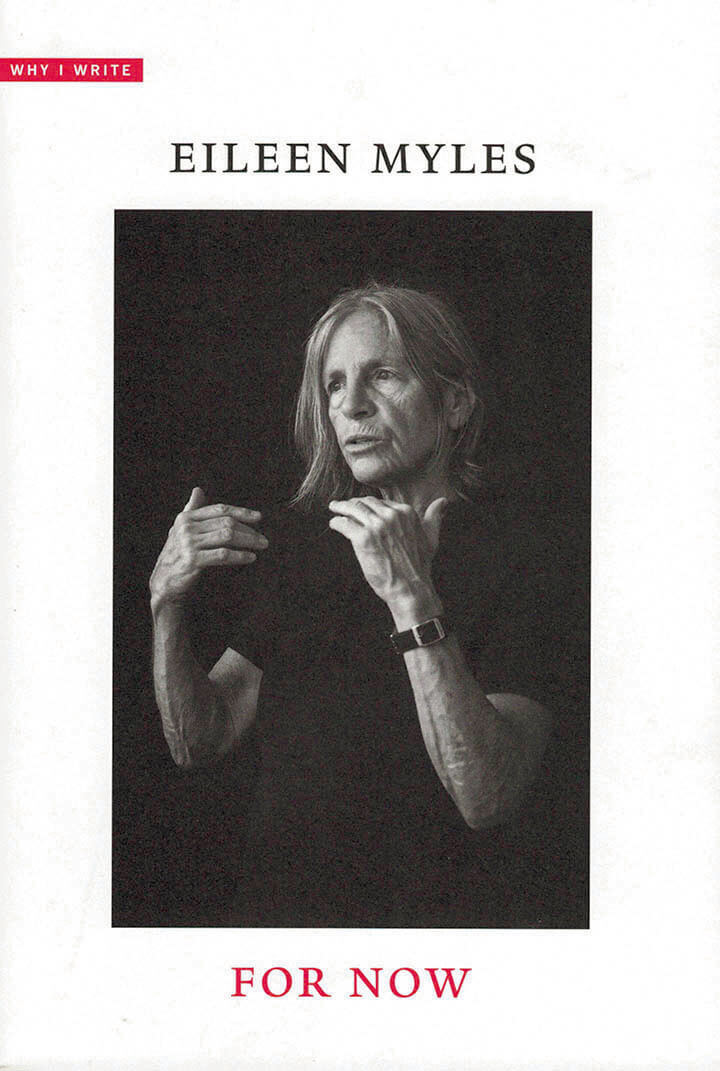
For Now
In this third Why I Write volume, Eileen Myles addresses the social, political, and aesthetic conditions that shape their work.
In this raucous meditation, Eileen Myles offers an intimate glimpse into creativity's immediacy. With erudition and wit, Myles recounts their early years as an awakening writer; existential struggles with landlords; storied moments with neighbors, friends, and lovers; and the textures and identities of cities and the country that reveal the nature of writing as presence in time.
For Myles, time's "optic quality" is what enables writing in the first place, as attention, as devotion, as excess. It is this chronologized vision that enables the writer to love the world as it presently is, lending love a linguistic permanence amid social and political systems that threaten to eradicate it. Irreverent, generous, and always insightful, For Now is a candid record of the creative process from one of our most beloved artists.

Translation is a Mode = Translation is an Anti-neocolonial Mode
Don Mee Choi is the author of three books of poetry and hybrid essays, and an award-winning translator of contemporary Korean women’s poetry. In this pamphlet, Translation is a Mode=Translation is an Anti-neocolonial Mode, she explores translation and language in the context of US imperialism—through the eyes of a “foreigner;” a translator; a child in Timoka, the made-up city of Ingmar Bergman’s The Silence; a child from a neocolony.
This pamphlet is part of UDP’s 2020 Pamphlet Series: twenty commissioned essays on collective work, translation, performance, pedagogy, poetics, and small press publishing. Each offers a different approach to the pamphlet as a form of working in the present, an engagement at once sustained and ephemeral.

More-than-Human
Lucia Pietroiusti, Marina Otero Verzier and 1 more
The More-than-Human reader brings together texts that reflect on the state of post-anthropocentric thinking today, by writers from a wide range of disciplines. Focusing on the ecologies and technologies of climate injustice and inequalities, as well as the destructive structures lurking within anthropocentrism, More-than-Human proposes complex entanglements, frictions, and reparative attention across species and beings.
Thinking past the centrality of the human subject, the texts that compose this reader begin to imagine networks of ethics and responsibility emerging not from the ideologies of old, but from the messy and complex liveliness around and beneath us.
Rather than attempting to be a comprehensive compendium on the topic (which would be virtually impossible), More-than-Human provides a cross-section of the breadth and vitality of a literary, scientific, and conceptual milieu where multiple strands of work intersect even as they are frequently regarded as belonging to separate disciplinary discourses.
Contributors: Stacy Alaimo, Ramon Amaro, Karen Barad, Rosi Braidotti, Octavia Butler, Georges Canguilhem, Marisol de la Cadena, NASA History Department, Silvia Federici, Scott F. Gilbert, Édouard Glissant, Jack Halberstam, Donna Haraway, Myra J. Hird, Kristina Lyons, Patricia MacCormack, John T. Maher, Michael Marder, Timothy Mitchell, Reza Negarastani, Jussi Parikka, Elizabeth Povinelli, Paul B. Preciado, María Puig de la Bellacasa, Filipa Ramos, Isabelle Stengers, Elly R. Truitt, Anna L. Tsing, Eduardo Vivieros de Castro, Jason Wallin, Kathryn Yusoff and Joanna Zylinska.

BEZNA
Irina Gheorghe, Florin Fleuras and 1 more
Bezna is darkly glowing dead thinking, cosmic pessimism, hairy autonomy, inner reptilians, limbo sighs, horrendous pink volumes, underground nematodes, happy dismemberment, haunting prehumanism, compassion crises, glowing horror, sinister moods, aesthetic autophagia, postspectacle shelters, eternal stillness, future plague, decomposing knowledge, ouroboric moves, idiot nonknowing, shadow bodies, netherworld excavations, imperceptible evil, hyperbolic specters and news from Cioran.
Bezna's first issues were edited by Florin Flueras, Veda Popovici and Arnold Schlachter, the last ones by Florin Flueras, Irina Gheorghe and mainly by Alina Popa, in the memory of which this anthology is published.
'Bezna' in Romanian means consistent darkness + diffuse fear
Edited by: Alina Popa, Florin Flueras, Irina Gheorghe, Veda Popovici, Arnold Șlahter, Claudiu Cobilanschi
Contributions by Roi Alter, Aparat Security, Aulos, Brynjar Abel Bandlien, Emil Cioran, Ciumafaiu, ClaudiuCobilanschi, Octavian-LiviuDiaconeasa, Valentina Desideri, Bogdan Draganescu, Ion Dumitrescu, Florin Flueraş, Irina Gheorghe, Amy Ireland, Sarah Jones, Anastasia Jurescu, Kroot Juurak, Deanna Khamis, Mihai Lukacs, Nicola Masciandaro, G.A. Neagu, Dorothee Neumann, Cosima Opartan, Paradis Garaj, Alina Popa, Veda Popovici, Arnold Slahter, Taulipang Indians of Guyana, The Bureau of Melodramatic Research, The Presidential Candidate, Eugene Thacker, Stefan Tiron, Dylan Trigg, Tea Tupajic, Akseli Virtanen, Ben Woodard.

Brush Fires in the Social Landscape
Brush Fires in the Social Landscape began in collaboration with the artist before his death in 1992 and first published in 1994, engaged those who Wojnarowicz would refer to as his tribe or community.
Now, on the twentieth anniversary of Brush Fires, when interest in the artist's work has increased exponentially, Aperture has expanded and redesigned this seminal publication to be even more inclusive. It is the only book that features the breadth of Wojnarowicz's work with photography.
The contributors, from artist and writer friends to the lawyer who represented him in his case against Donald Wildmon and the American Family Association, to the next generation of artists who were influenced by Wojnarowicz's sensibility, together offer a compelling, provocative understanding of the artist and his work.
Contributors include: Vince Aletti, Barry Blinderman, Cynthia Carr, David Cole, Shannon Ebner, Leonard Fink, Karen Finley, Nan Goldin, Félix Guattari, Wade Guyton, Melissa Harris, Elizabeth Hess, Tessa Hughes-Freeland, Peter Hujar, Fran Lebowitz, Lucy R. Lippard (introduction), Sylvère Lotringer, Carlo McCormick, Henrik Olesen, Wendy Olsoff, Adam Putnam, Tom Rauffenbart, James Romberger, Emily Roysdon, Marion Scemama, Gary Schneider, Amy Scholder, Kiki Smith, Andreas Sterzing, Zoe Strauss, Marvin J. Taylor, Lynne Tillman, and Wolfgang Tillmans.
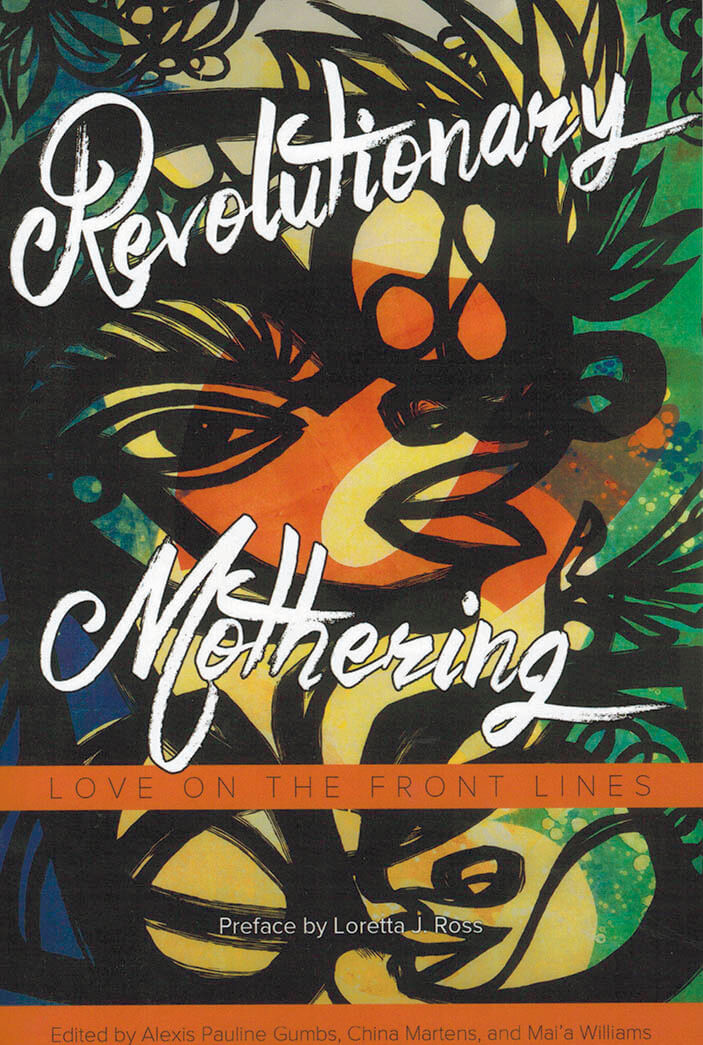
Revolutionary Mothering: Love on the Front Lines
Mai'a Williams, China Martens and 1 more
Revolutionary Mothering: Love on the Frontlines is an anthology that centers mothers of color and marginalized mothers' voices, women who are in a world of necessary transformation. The challenges faced by movements working for antiviolence, anti-imperialist, and queer liberation, as well as racial, economic, reproductive, gender, and food justice are the same challenges that marginalized mothers face every day.
Motivated to create spaces for this discourse because of the authors' passionate belief in the power of a radical conversation about mothering, they have become the go-to people for cutting-edge inspired work on this topic for an overlapping committed audience of activists, scholars, and writers. Revolutionary Mothering is a movement-shifting anthology committed to birthing new worlds, full of faith and hope for what we can raise up together.
Contributors include alba onofrio, Alexis Pauline Gumbs, Ariel Gore, Arielle Julia Brown, Autumn Brown, Cheryl Boyce-Taylor, China Martens, Christy NaMee Eriksen, Claire Barrera, Cynthia Dewi Oka, Esteli Juarez Boyd, Fabielle Georges, Fabiola Sandoval, Gabriela Sandoval, H. Bindy K. Kang, Irene Lara, June Jordan, Karen Su, Katie Kaput, Layne Russell, Lindsey Campbell, Lisa Factora-Borchers, Loretta J. Ross, Mai'a Williams, Malkia A. Cyril, Mamas of Color Rising, Micaela Cadena, Noemi Martinez, Norma A. Marrun, Panquetzani, Rachel Broadwater, Sumayyah Talibah, Tara CC Villaba, Terri Nilliasca, tk karakashian tunchez, Victoria Law, and Vivian Chin.
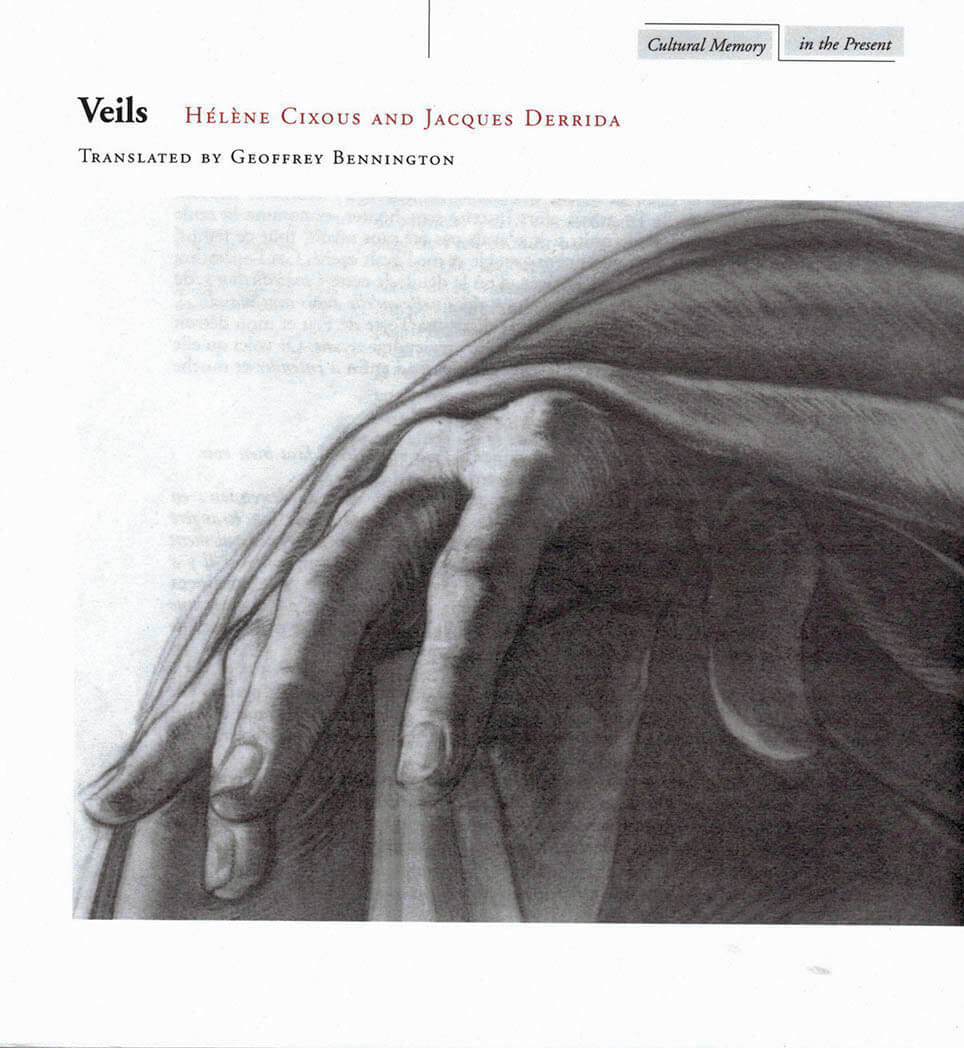
Veils
Hélène Cixous, Jacques Derrida
This book combines loosely "autobiographical" texts by two of the most influential French intellectuals of our time. "Savoir," by Hélène Cixous is an account of her experience of recovered sight after a lifetime of severe myopia; Jacques Derrida's "A Silkworm of One's Own" muses on a host of motifs, including his varied responses to "Savoir."
Hélène Cixous is Professor of Literature and Director of the Centre d'Etudes Feminines, Paris VIII. Jacques Derrida is Director of Studies at the Ecole des Hautes Etudes en Sciences Sociales, Paris, and Professor of Humanities at the University of California, Irvine. Stanford has published nine of his books, most recently Of Hospitality, which also includes a text by Anne Dufourmantelle (Stanford, 20
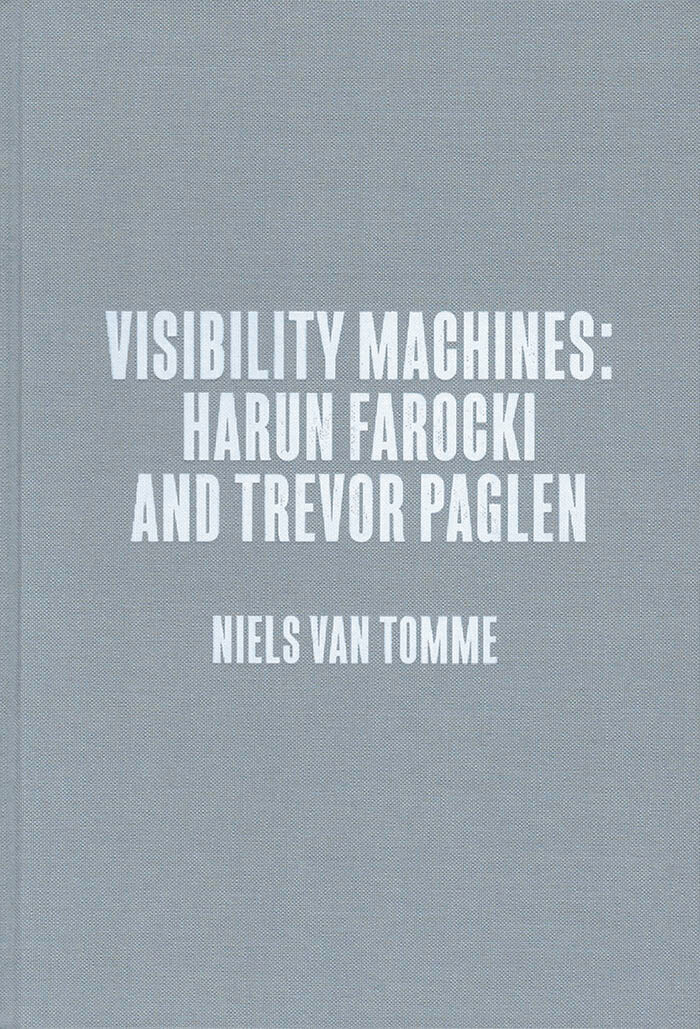
Center for Art, Design and Visual Culture
Visibility Machines: Harun Farocki and Trevor Paglen
Visibility Machines explores the unique roles that German filmmaker, video artist and author Harun Farocki (1944-2014) and American artist and author Trevor Paglen (born 1974) play as meticulous observers of global military operations. Investigating forms of surveillance, espionage and weaponry, Farocki and Paglen both examine the ways in which military activities transform and politicize our relationship to images and the realities they appear to represent.
The publication contains a number of newly commissioned essays by esteemed scholars who approach the work from diverse thematic perspectives, in addition to texts by Farocki and Paglen, as well as three exclusive visual essays exploring themes emerging from a dialogue between their work.